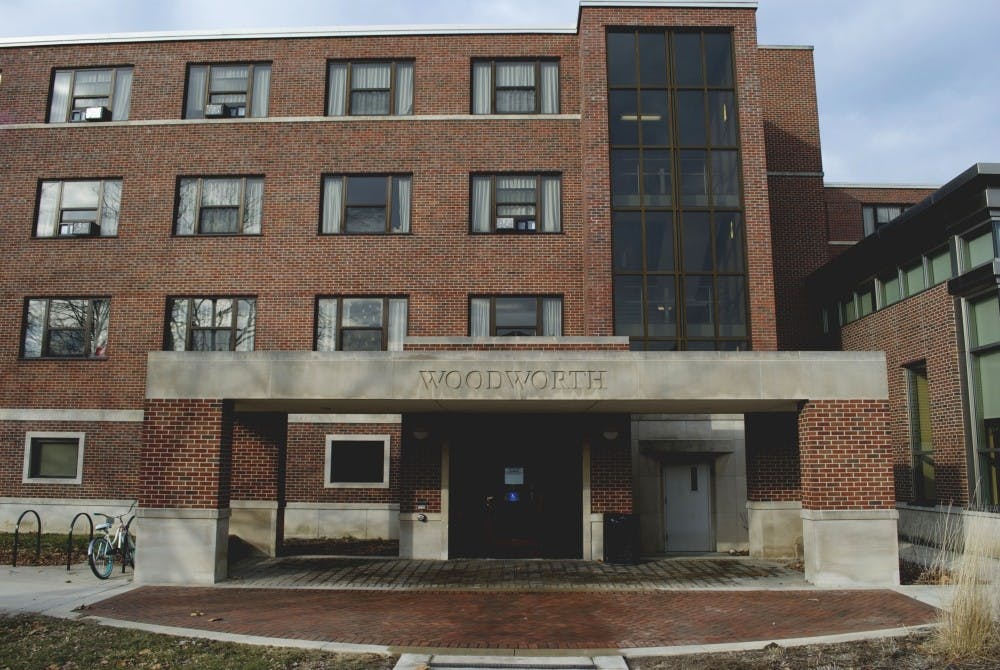For more than 60 years Woodworth Complex has housed suites for sororities and their members to hold small meetings, do homework, eat lunch or socialize.
At the end of this year, however, the suites will go through a transition.
By the beginning of the 2019 fall semester, the sorority suites in Woodworth Complex will be converted to double rooms in accordance with the Housing Master Plan, said Chris Wilkey, assistant director of Housing and Residence Life for Marketing and Communications and Technology.
Wilkey said there are currently seven suites in Woodworth Complex and six of them are in use this school year.
The seven sororities using the suites are Alpha Chi Omega, Alpha Omicron Pi, Alpha Phi, Chi Omega, Delta Zeta, Phi Mu and Pi Beta Phi.
“The need for space is projected to increase over the next few years,” Wilkey said in an email.
Julianna Shamel, senior and Alpha Omicron Pi chapter president, confirmed Wilkey’s remarks.
"What we understand from the Office of Greek Life, Ball State is moving to expand,” Shamel said. “Our contracts have come up and they're looking to renovate those for future students. That's really all we know."
Shamel said there are currently no plans for the university to provide alternatives.
"They're not really sure if they will have anything to provide us,” Shamel said.
She did, however, say that some sororities, including hers, are looking at new arrangements on their own.
“I think at this point, a lot of Panhellenic organizations, and I can't speak for all of them, but I can speak for my own, we are looking for alternative places in Muncie,” Shamel said.
“We are looking for some homes in the Muncie area or maybe an apartment. Just like a room that we can rent out for the year to store our stuff in. So we're kind of searching for alternatives right now,” she said.
There have been past debates saying that because Ball State fraternities have houses, sororities should too.
However, there is a rumor dating back to the 1960s that six or more women living in a house together is technically considered a brothel, which has has since been debunked a myth.
Melissa Peckinpaugh, Muncie City Clerk, previously told The Daily News she has never seen an ordinance that prohibits more than five women from living in a house together, and nowhere in the city ordinances does it mention the word brothel, or laws on how many unrelated women can live together.
Despite debunking the myth, Shamel said sorority life is better without houses due to lack of competition among Panhellenic organizations.
“I actually don't mind not having a house because I believe it eliminates competition between PHA groups and also just makes it to where there's an even playing field, unlike campuses where there are sorority houses,” Shamel said.
Shamel said at bigger schools where sorority houses are present, houses can be used as an advantage when recruiting or retaining new and current members.
“When a PNM or potential new member really likes a home, they're going to be more likely to choose that sorority over someone else's that didn't have that nice of a home.” Shamel said.
“When we all come together in the Student Center, and we don't really have any of that, it's solely based on who we are as people and our personalities as a group.” Shamel said. “It's not based off of anything materialistic."
She also said it allows for more friendships with women from other organizations.
“Our Panhellenic groups are very close, and my women have friends in other sororities. I'm very close with all of the PHA presidents. So, it's nice not to have them," Shamel said.
While some believe that without the suites the members will be without a place to live, Shamel said the suites were nothing more than a common space.
"Nobody lives in our suites. It's a common misconception for a lot of people,” Shamel said. “Our suites are actually just holding places for our stuff and they are kind of an essential meeting place for our women. It's our main base on campus."
Kathy Wolf, vice president for marketing and communications, said sororities will still be able to use other places on campus for meetings.
“The sororities have outgrown the space available in the suites,” Wolf said. “They have for several years used other campus space for meetings and will continue to do so.”
From 2016-17, Ball State was looking into a proposed plan called the “Greek Village Project” to build townhome-style houses for each of the Panhellenic organizations.
"We looked into an opportunity my sophomore year to get sorority housing all together as a Panhellenic and do townhomes, but we all decided against that just due to policy things,” Shamel said.
The project did not come to fruition because the organizations’ national chapters were unable to agree on a lease length.
“The university did work with the national sororities for nearly ten years to develop sorority housing,” Wolf said. “A final agreement was not reached to the proposal that had been developed and there are no current plans to pursue sorority housing.”
Sororities are able to have houses on campus, as long as they do so as a separate entity from the national panhellenic organizations.
"If we wanted to go our own ways and just do them on our own where we just rent out a property or something like that, that wouldn't have to be agreed on by Ball State, really,” Shamel said.
Alpha Gamma Delta and Sigma Kappa each had their own houses as recently as the spring of 2017, but both have since been torn down to make way for the ongoing construction of the Health Professions Building. Phi Mu and Kappa Delta also have had houses in the past, but those have been torn down as well.
Contact Evan Weaver with comments erweaver@bsu.edu.





